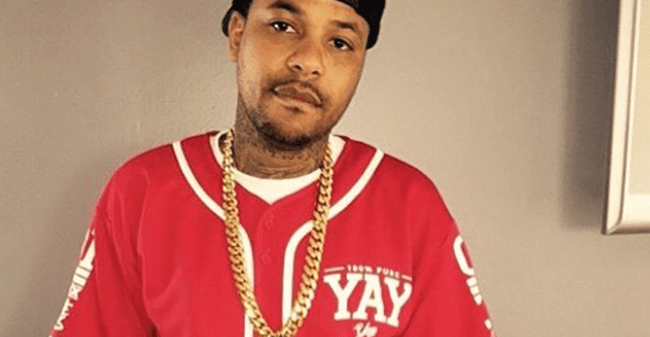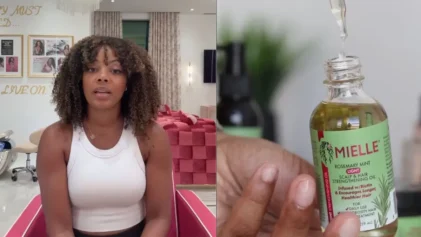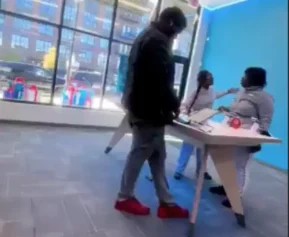
After three years and no talk of any significant leads, a suspect has been arrested in Chinx’s murder, the Queens, N.Y. rapper who was gunned down in his car on May 17, 2015. He was 31 years old at the time and affiliated with French Montana and his Coke Boys crew.
According to New York news outlet PIX 11, the man who was taken into custody is 32-year-old Quincy Homere, a resident of Long Island. At this time, he’s been charged with murder, assault, criminal possession of a weapon and attempted murder, since Chinx’s friend Antar Alziadi was in the passenger seat at the time of the shooting. He was hit twice in the back but survived.
In addition, TMZ reported that 26-year-old Jamar Hill was arrested as well and he faces the same charges as Homere. Both men were also in jail at the time of their arrest on unrelated charges.
There aren’t any details on how the arrest came about and what evidence the NYPD secured. There is a video, however, of a handcuffed Homere walking with police into a building while he covered his face.
https://www.instagram.com/p/BcsD29AjYJj/?hl=en&taken-by=chinxmusic
In recent years, including in 2017, there have been a number of rappers murdered, like the Atlanta artists Bambino Gold and Yung Mazi, the Washington D.C. rapper 30 Glizzy, Detroit rapper Doughboy Roc and Meek Mill’s artist Lil Snupe to name a few. Sadly, none of those cases have been solved and the killers are running free to this day.
Many of the older cases that involve murdered rappers haven’t been solved either, with Tupac Shakur, the Notorious B.I.G. and Jam Master Jay’s cases probably being the most well-known.
Besides those men, the other unsolved murder rap cases include the Boogie Down Productions member Scott La Rock killed in 1987, Wreckx-n-Effect member B-Doggs murdered in 1990, New York rapper Big L gunned down in 1999, New Orleans’ Soulja Slim killed in 2003 and New York rapper Stack Bundles murdered in 2007.
So the fact that an arrest was made in Chinx’s murder may surprise a lot of people, considering the extremely low number of arrests that are made when rappers get killed. In fact, it’s so rare that rap murders get solved there are a number of documentaries and books about it that many people have financially capitalized from.
Related news: Hip-Hop
Damon Dash Joins Others in Hip-Hop Who Regret Disrespecting Women
JAY-Z Turns 48: Does Hip-Hop Have an Age Limit?
[Exclusive] David Banner Talks the Hip-Hop Generation Gap After Waka Flocka and Pete Rock Beef
In 2015 XXL conducted a study and found out of 52 homicides that involved a rapper being killed, 36 of those cases were unsolved (69 percent), which is just a 30% clearance rate. In the year the study was conducted, the clearance rate in the United States as a whole was 64.1 percent, to give an idea of how big the discrepancy.
Throughout the years, some have accused the police of having a certain level of indifference in these types of cases because not only are young Black men involved but young Black rappers, who often glorify the same violence that took their life.
Others have pointed to the “no snitching” code that many in hip-hop follow, people like former NYPD detective Derrick Parker, also known as the hip-hop cop. Parker has been involved with the Biggie, Tupac and Jam Master Jay investigations, but he’s now retired.
“The first thing that will stop or hinder an investigation in most cases is the cooperation of witnesses or a lack of crime scene evidence,” he told Okayplayer. “The biggest thing in most of these cases, actually, are cooperation of people that might have seen something or were actively involved. Nobody wants to ever come forward with any relevant information. Nobody wants to snitch, as they say in the streets … Nobody wants to offer testimony to the District Attorney’s office that would eventually lead to a prosecution or a conviction of the perpetrators involved in the case.”
Another argument could be that police use the “no snitching” code as an excuse to explain why some rap murders haven’t been solved. Plus, the way it seems, homicide detectives and the general public haven’t forgotten about Cam’ron’s comments regarding snitching in that infamous “60 Minutes” interview from a decade ago.
“The type of business I’m in, it would hurt my business,” said Cam about working with law enforcement to help solve a crime. “And the way that I was raised, I just don’t do that.”
The interviewer Anderson Cooper then asked the rapper if he knew where a serial killer lived would he report it to police?
“If I knew the serial killer was living next to me, I wouldn’t call and tell nobody on them, but I’d probably move,” Cam’ron replied. “But I’m not putting the signs up, ‘The serial killer’s in 4E.'”
Later Cam’ron issued an apology and said he saw how his comments could be taken as offensive, especially to those whose loved ones have been killed.
But Langston Wilkins, who holds a PhD in Folklore and Ethnomusicology, a master’s degree in African-American and African Diaspora Studies and also instructed the class “Survey of Hip-Hop at Indiana University, said the low number of rap murders has to do with a lack of trust for police and the no snitching code combined.
Wilkins also said the unsolved cases in hip-hop point to the exact same problem in the larger Black community.
“You cannot divorce hip-hop from the larger working class Black culture that it emerges from,” he told Atlantic Black Star. “A large amount, if not most, murders of young Black men go unsolved. This is due to lack of interest from law enforcement and African Americans’ lack of trust in the police, which leads to little cooperation. No snitching is a general Black street code that influences hip-hop culture. So I think hip-hop simply reflects a larger societal problem in this regard.”


